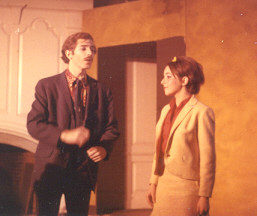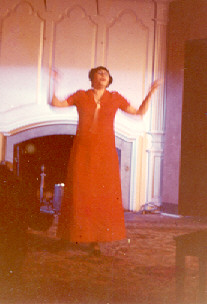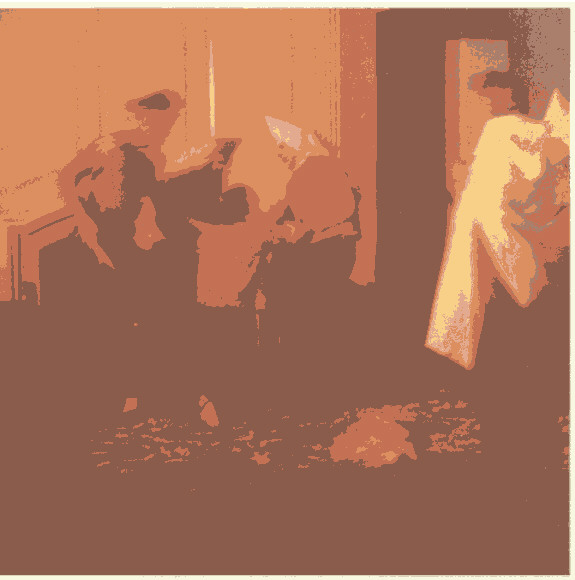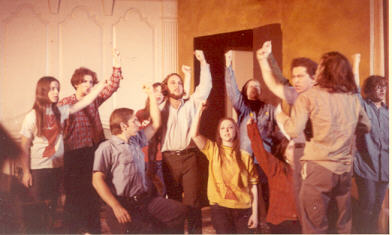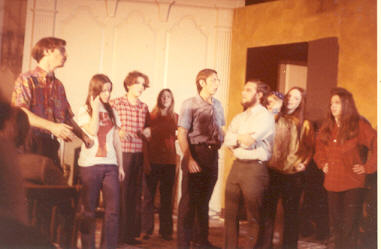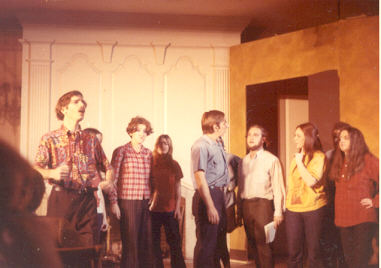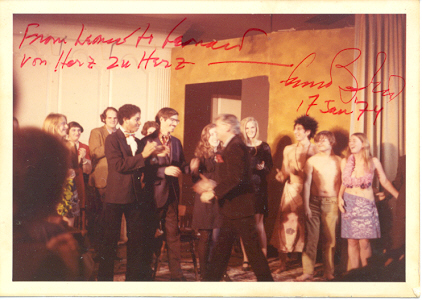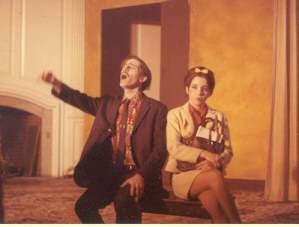I've Got the Tuneone-act radio song-playby Marc Blitzstein, 1937 commissioned by Columbia Broadcasting Corporation, dedicated to Orson Welles. Broadcast on WABC, Oct. 24, 1937, directed by Irving Reis, conducted by Bernard Hermann. CAST Mr. Musiker: Marc Blitzstein Beetzie: Shirley Booth Madame Arbutus: Adelaide Klein Captain Bristlepunkt: Kenneth Delmar Private Schnook: Norman Lloyd The Suicide: Lotte Lenya --her first radio role in the U.S. Choral Director: Hiram Sherman CAST of the 1970 adaptation by Leonard Lehrman, produced at Lowell House, Harvard, Dec. 5, 10-12, 1970: Mr. Musiker: Leonard Lehrman Beetzie: Jane Sass Madame Arbutus: Joan Trachtman Captain Bristlepunkt: John Karol [pseud. for Karol Kostka] Private Schnook: Michael Cline The Suicide: Katya Brous Choral Director: Jib Lampl Pianist: David Hessney Choreographer: Wakeen Ray-Riv --now known as Joaquin LaHabana Also appearing in the crowd scenes: Larry Bakst, Ira Biegeleisen, Ross Halper, Joan Lucas, Liz McLaughlin, Louisa Roof, Leslie Rubin, Stephanie Schlegel, Sharman [Haley] Publisher: Chappell (out of print) [now Boosey & Hawkes] Press comments: Jan Bedell, "Preview: House Opera : premiering and revival," [excerpts] arts and amusements, Harvard Independent, December 3-9, 1970. Harvard musical-dramatic groups have lately been on a "30's" kick: they have been busy attempting to resurrect the dusty remains of depression-era musical theater. Examples of this trend last year were the productions of Marc Blitzstein's The Cradle Will Rock at the Ex and Weill's Johnny Johnson at the Loeb. But now that we are beginning to see more parallels between our own period and the '30's' every day, this fascination with the past seems to take on a certain logic. On Saturday, December 5, the '30's' will strike again at Lowell House where a trilogy of short operas will be performed: Marc Blitzstein's The Harpies (1931) and I've Got the Tune (1938), and, a later work, Leonard Bernstein's Trouble in Tahiti (1952). These productions should be of special interest, particularly to Blitzstein fans, because they will mark the second performance anywhere of The Harpies and the Boston premiere of I've Got the Tune. Most of the impetus for these productions has been generated by multi-talented Leonard Lehrman '71, who will be acting as musical director for two of the operas, stage director and protagonist for another, and producer for all three. Lehrman is himself a composer, and he directed the Loeb Ex production of The Cradle Will Rock last year. He admits to a strong personal identification with composer Blitzstein: "the more I read about him, the more parallels I see between his life and mine; I almost begin to think I'm becoming him!" Lehrman conceives of the productions as "an evening in memory of Marc Blitzstein." (The Ber[n]stein opera was included because Bernstein was a close friend of Blitzstein and was greatly influenced by him; in fact Trouble in Tahiti is dedicated to Blitzstein.) Blitzstein (1905-1964) was one of the angry young men of the American musical scene in the 1930's. At first, he composed for the small elite corps of modern music enthusiasts. During the '30's, he became a convert to Socialism and began to feel that the artists must create from a sense of social responsibility. He became concerned with writing "music for the masses"; his musical style became more influenced by jazz and Broadway musical elements. The libretti of his operas dealt with social issues: labor unions vs. big business in The Cradle Will Rock and Nazism and anti-war sentiment in I've Got the Tune. A close friend of Kurt Weill, he arranged the English version of Threepenny Opera. I've Got the Tune is, according to Lehrman, Blitzstein's autobiography. It describes a composer's search for the right words (social value) for a tune he has written. The composer tries to give the tune to a variety of individuals and groups, from Tin Pan Alley to a crypto-Nazi organization, but finally finds the words he wants in the mouths of a group of peace demonstrators.... If you are a Blitzstein or Bernstein enthusiast, or just generally interested in musical theater, you shouldn't miss the Lowell House productions. As with all revivals of forgotten works, if you don't see them now, you may never have another chance. * * * * * * * * Jan Bedell, "kudos to revivalists," [excerpts] arts and amusements, Harvard Independent, December 10-16, 1970. Despite my slightly disparaging remarks last week about the wisdom of attempting to revive old words which were less than successes when they were new, I was pleasantly surprised by the productions of Marc Blitzstein's The Harpies and I've Got the Tune and Leonard Ber[n]stein's Trouble in Tahiti which opened at Lowell House on December 5th... an evening of very entertaining and sometimes moving musical theater.... I've Got the Tune... is a series of brief episodes about a composer's search for words for a melody he has written.... Two performers were outstanding: Joan Trachtman did a hilarious parody of the avant garde music of the 1920's (the Pierrot Lunairee [sic] sprechstimme school), and John Karol was the consummate sadistic heavy as the leader of the neo-Nazi Purple Shirts. Director Leonard Lehrman (the producer of all three operas) played a very intense composer.... The Harpies... is a parody of "serious" modern opera and neo-classicism. Director-choreographer Wakeen Ray-Riv did an amusing spoof of the stylized movements which he created for Curlew River last year at the Busch. The music was heavy with "significance," and the performers all caught the spirit of operatic hyperbole. Larry Bakst was a properly loud tenor and an improperly low comedian as Phineas, the Harpies' victim. Juliet Cunningham transformed the traditional heavenly messenger, who rescues all concerned, into a splendid sexpot. Bernstein's Trouble in Tahiti is not a forgotten work and doesn't deserve to be. It is a skillfully written little one-act with an attractive score (shades of West Side Story to come), and a libretto that is a fine blend of social criticism and humor. The Lowell House production, directed by Juliet Cunningham, emphasizes the humor, somewhat at the expense of the pathos. Lewis Perry and Joan Lucas were Sam and Dinah, the suburban couple who lose each other in the process of gaining material success. Both sang well.... Commenting on the action and forming an ironic contrast with the troubled couple, was a slick Madison-Avenue, skat-singing trio (well-performed by Liz McLaughlin, Larry Bakst, and Ross Halper); they sold the joys of Suburban life with Ultra-Brite smiles and lyrics. The decision to act out the 10th-rate film about Tahiti which the couple uses as an escape from their boredom made for a very funny scene.... Kudos to pianists Leonard Lehrman and David Hessney for fine musical support for all the casts. As an extra added attraction, Leonard Bernstein himself was on hand on opening night to take a bow. He won't be there when the productions continue on December 10, 11 and 12th, but the operas can easily hold plenty of interest on their own. * * * * * * * * Ann Derrickson, "Blitzstein's Spirit Looms Large," [complete] Dunster Drama Review, X:1, Feb. 1971 - originally written for but not printed in Harvard Crimson, Dec. 11, 1970. Blitzstein: "I'VE GOT THE TUNE" and "THE HARPIES" Bernstein: "TROUBLE IN TAHITI" presented by Adams, Lowell, and Winthrop Houses Musicals by, for and about Marc Blitzstein jammed themselves into the Lowell House Junior Common Room last December 5, 10, 11 and 12. But, despite the cramped quarters, the crowd of actors gave free rein to a crowd of emotions. When Blitzstein is funny, he is very, very funny, but, when he grows serious, he is bitter. "I've Got the Tune," Blitzstein's autobiographical opera, holds deep personal significance for friends of the composer, who died in 1964. Leonard Bernstein, who knew him and attended the show's premiered, said sincerely, "I was deeply touched by 'I've Got the Tune.' The performance was very moving. Blitzstein would have loved it." Producer-director Leonard Lehrman ([Harvard] '71, [Dunster] C-22), immersed in Blitzstein's life and work, felt total involvement in the play. With enthusiasm he entered into the lead role, Mr. Musiker, a part Blitzstein himself played in the opera's 1937 radio version. Mr. Musiker, the composer who's got the tune, is looking for the right lyrics, or social value. What are the only fitting words? Those a of a peace demonstration, of course. But the tune does not rest with the war issue until it has vented Blitzstein's indignation in many other areas. With devastating humor he mocks snobby, "cult-shed" society leaders in the figure of Mme. Arbutus. Joan Trachtman was hysterically funny in the role, wallowing in whiskey and schmaltz, whimpering a poem about the moon as she swooned to the floor in esthetic ecstasy. Abruptly changing tone, Blitzstein barely controls his anger in his parody of Nazism, the "Purple Shirties," who victimize Mr. Musiker. Masterfully, John Karol portrayed the monstrously sadistic Capt. Bristle-punkt, head of the brotherhood based on hatred. Next on the program, "The Harpies" revels in the trappings of Greek drama but retains the excruciatingly funny, farcical style of Mme. Arbutus' salon. Wakeen Ray-Riv's creative direction and choreography lightened Blitzstein's elaborate spoof. And so did the costuming -- or lack of it -- for when the mythical creatures appeared in the flesh, they were very obviously in the flesh, clad only in loincloths and netting. With great gusto Larry Bakst played the blind prophet whose food the Harpies continually snatch away. His clothing called forth from the audience many a belly laugh, especially when, in peace at last, he crammed fruit into his mouth, contentedly waving good-bye to Iris with a banana. Juliet Cunningham, as Iris the intervening goddess, displayed a powerful and beautiful voice. The final musical, Bernstein's "Trouble in Tahiti," dedicated to Blitzstein, is the least allegorical of the three, the least strained and therefore the most natural. Sam and Dinah, a suburban couple who have fallen out of love, appeal simply and directly to the audience's sympathy. A slick, chic chorus of three deftly conjure up the shallow, artificial world of "chlorophyll toothpaste and Book-of-the-Month Club." Joan Lucas and Lewis Perry, in the leads, sang of their empty lives with delicious melancholy. Both seemed sincere and human, responding to Juliet Cunningham's gentle, subtle direction. The actual acting out of the Tahitian-movie scene was a creative, humorous touch. Clumsily, the witch-doctor fumbled with the temperamental cigarette lighter, while native girls in sexily swaying grass skirts charmed the audience. Bernstein approved of the innovation, calling the girls "delightful." In the small, crowded room, in an evening's short time, scenes shifted, characters changed and emotions ran the gamut. But the spirit of Blitzstein loomed large and steady: his wit, his compassion, his humanity. If you missed it, Trouble in Tahiti will be performed again, in concert version, at Brookline Temple Ohabei Shalom's Arts Festival, April 14. * * * * * * * * | Dec. 5, 1970 Photos by N.S. Lehrman, M.D. 
Mr. Musiker, a composer, hires a secretary, Beetzie. 
On a park bench, he sings her his tune. Their quest: to find the right words! MUSIKER: "There will be someone who wants my tune!" BEETZIE: "O.K. First stop: Madame Arbutus, Penthouse Park Avenue." 
ARBUTUS: "Of course it was too simple, your tune. I have added some complications! (sings:) 'The moon is a bloody rag tonight!' Ah! It is so grand to be so bored! You can afford the kind of music you cannot stand!" MUSIKER to BEETZIE: "Let's get out of here!" Next stop: a men's club, the Purple Shirts. 
An initiation ceremony culminates in a beating. Musiker's neighbor has written despairing words to the tune.  Before they can stop her, she jumps to her death. MUSIKER: "Maybe I was wrong. Maybe nobody wants my tune. I think I'll go back to my ivory tower." And then..., the sounds of marching feet. A May Day parade wants a new song to sing!  He sings them his tune.  They mull it over,  and find the right words! Photograph of Leonard Lehrman and Blitzstein's nephew, Christopher Davis, who came up for the performance,  as did Leonard Bernstein,  who signed this curtain call picture 37 months later: "From Leonard to Leonard, von Herz zu Herz." Original [quasi-censored] final chorus, 1937: Because this is our day, because this is our time, We're singing songs of May in every land and clime. New words in 1970 adaptation: Because this is our day, because this is our time, We demonstrate today and we don't care if it's a crime! * * * * * * * * David Sterritt, "Harvard opera--Blitzstein and Bernstein," [excerpts] Christian Science Monitor, Dec. 8, 1970 Harvard University's Lowell House Music Society and producer Leonard J. Lehrman have certainly had moral support from high places for their current operatic evening, a tribute to the late Marc Blitzstein. As the proceedings opened Mr. Lehrman read a telegram of good wishes received from Lotte Lenya (who created one of the roles in "I've Got the Tune"), and during the final curtain call none other than Leonard Bernstein came bouncing happily to the stage to embrace the cast and take a bow. ...In energy and enthusiasm, ... the musical values of the three one-act operas were the most successful elements of the evening.... One imagines that the taped version to be aired on WHRB, WGBH, WBRS, and other radio stations will be most enjoyable. Two Boston premieres kicked things off--Blitzstein's "I've Got teh Tune" and "The Harpies." Mr. Lehrman directed and stars in "Tune," a bittersweet parable about a composer who travels around the world looking for a place where his latest melody "belongs": he finds it only when a group of demonstrators turn the tune into a strike-song. A '30's flavor still clings strongly to this cheerily militant little tale, and the Blitzstein music remains engaging and surprisingly fresh-sounding. Mr. Lehrman's staging is simple and occasionally very funny.... The gung-ho finale... is expansive and... moving. Blitzstein's "The Harpies," next on the bill, is sporadically amusing under Wakeen Ray-Riv's well-paced direction.... Rounding off the evening is Bernstein's "Trouble in Tahiti," an extravagantly staged, exuberantly sung parody of modern suburban living. Under Juliet Cunningham's direction, it proved the most consistently entertaining of the evening's pieces, though it lacked the concentrated thrust of the "Tune" finale. The show continues on Dec. 10, 11, and 12 at Lowell House. * * * * * * * * William D. Miranda, "Your World of Opera : Harvard Houses Honor Blitzstein," [excerpts]Jewish Advocate, December 10, 1970. Lowell, Adams and Winthrop houses of Harvard University unite to present last weekend and this, a production of three short works. Two are brief operas by Marc Blitzstein never before presented in Boston and the last is a work dedicated to the late composer, Leonard Bernstein's Trouble in Tahiti. The usual polish and expertise evident in such undertakings was here present in abundance. Tackling the Blitzstein works with an evident show of love the students gave them vitality and bridged the gap of time to make them viable stage pieces by astute and thoughtful directing. The first piece I've Got the Tune is about a composer who looks in vain for his melody in the salons of the pseudo-intellectual and the rallies of the fascist societies but finds a home for it in the midst of a workers' protest. The... infectuous [sic] spirit of the students carried the... piece with good-natured enthusiasm. Leonard Lehrman, who was the producer, music director and prime mover of the entire evening, led this first opera by the nose like a tame beast by playing the role of the composer, with Jane Sass as his lovable, feather-brained secretary. A villainous KKK leader-type was strongly delineated by John Karol and Joan Trachtman gave a wonderful impersonation of a Gertrude Stein salon queen in the ecstasies of artistic creation. Katya Brous as a frenzied suicide also attracted audience approbation. David Hessney accompanied at the piano playing the tuneful score with zeal. The second piece was the Harpies, a marvelously funny take-off on the classical myth with tenor Larry Bakst superb as the beleaguered Phineas whose every meal is beset by almost topless harpies. Juliet Cunningham as Iris acted as deus ex machina relieving the tense situation with authoritative singing. She also directed the final piece, Leonard Bernstein's Trouble in Tahiti which seems almost to grow in stature with every repetition. The direction was perfect to convey the serious message, that modern suburbian man is so wrapped up in himself that he cannot communicate and the message is as valid today as it was twenty years ago when the work was first presented.... Joan Lucas... was an intense and convincing Dinah and Lewis Perry as the over confident, oversuccessful Sam also did a fine job.... Ross Halper, Larry Bakst and Liz McLaughlin as the Greek-chorus trio set the mood and the stage as well. Wakeen Ray-Riv who did a constructive job of directing the Harpies choreographed all three works and was thoroughly successful. In the intimate surroundings the small but enthusiastic audience was overwhelmed by the appearance of Mr. Bernstein himself, who appeared out of respect for the late Mr. Blitzstein and Mr. Lehrman as well. Performances continue through this Saturday.... * * * * * * * * |
